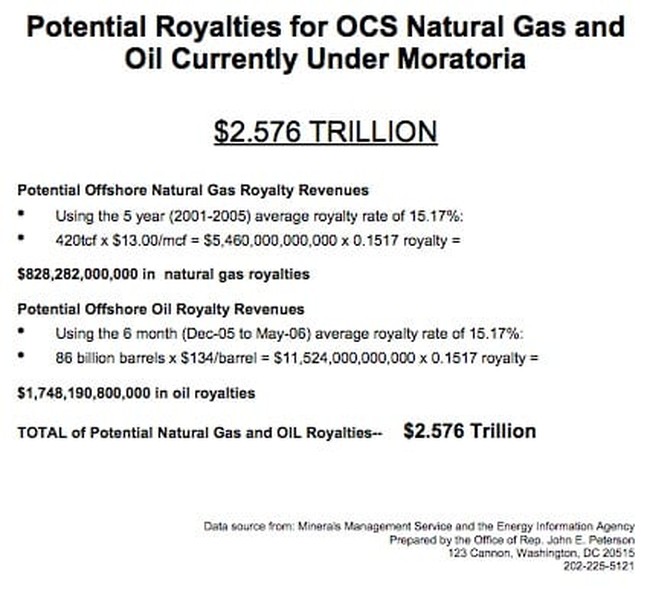As I write this column, the two major news stories are that:
- The Treasury $700-billion-plus bailout of the financial industry is in jeopardy — at least the blank-check, right-now, no-accountability version Treasury Secretary Paulson and Fed Chairman Bernanke appear wedded to.
- Harry Reid and Nancy Pelosi have apparently bowed to reality and will not try to renew the ban on offshore drilling for oil and natural gas that has annually been enacted into law for over a quarter-century.
Assume for the moment that the bailout passes and that the ultimate taxpayer loss runs into the hundreds of billions (in theory, it should be less than the amount Paulson and Bernanke want; but never underestimate the government’s ability to make a bad thing worse). Where is that money going to come from?
How about item 2 above?
One of the untold stories of the offshore drilling ban is how much the country has lost in tax revenues over a period of decades because of it.
Congressman John Peterson (R-PA) seems to be virtually alone in making this huge point. The numbers are stunning. In a PDF available at Peterson’s home page (at “Charts and Other Useful Information”), he tells us that “the United States is the only industrialized nation in the world which prohibits offshore exploration and production of domestic energy.”
The government collects royalties on oil and natural gas when it is extracted. Peterson’s office has obtained information from the Minerals Management Service and the Energy Information Agency showing that the average royalty rate based on market prices of the resources when extracted is 15.17%.
Earlier this summer, Peterson’s office prepared this summary (in HTML format here) of how much royalty money is just sitting there offshore:
Even if you adjust Peterson’s calculations to reflect current prices of roughly $100 a barrel for oil and $8/mcf for natural gas, the royalties locked up still amount to over $1.8 trillion (about $500 billion from natural gas and $1.3 trillion from oil).
But that’s only the beginning.
Estimates of known reserves have almost always been low and there is no reason to believe that things are any different now. An October 2005 OpinionJournal.com article quoted at this entry at my blog said that because of technological progress:
Between 1980 and 2002 the amount of known global oil reserves increased by 300 billion barrels, according to a survey by British Petroleum. Rather than the oil fields running dry, just the opposite has been happening.
Here’s one example of finding and/or getting more than originally thought: Over twice as much oil has come out of Prudhoe Bay than was initially predicted. It would not be at all surprising if that result is repeated with offshore reserves, especially because Congress has prohibited even exploring the areas involved for years. At the current price of oil, we’re talking at least another $1.3 trillion in royalties.
Then there’s shale oil. This Wikipedia entry shows over two trillion barrels in estimated U.S. reserves. Again assuming that only 10% is recoverable, that’s another $3 trillion in potential royalties.
If you’re keeping score, we’re at about $6.1 trillion. That’s more than 60% of the current national debt of of $9.8 trillion — and I ignored any potential additional royalties from natural gas. I also haven’t considered potential oil from sands, oil and gas from North Dakota’s Bakken Formation, oil and gas from the Great Lakes, or oil and gas from other inevitable future discoveries.
Oh, and I forgot to tell you that, according to a spokesman for Congressman Peterson, the royalty rate for land-based extraction is typically much higher than 15% and that states also collect substantial royalties on top of what Uncle Sam gets. (I never expected this or I would have called on Tuesday.)
Is anyone else besides me infuriated that for decades, while usually whining that taxes haven’t been high enough, both the executive and legislative branches of our supposedly “by the people, for the people” government have mostly done all they can to keep us from using and benefiting from our own resources?
Here’s the financial industry bailout tieback: I don’t think it’s a good idea, especially in its current unaccountable form. But if it happens and its unprecedented scope finally forces us to face up to the fact that taxpayers only have so much money, that the national debt is becoming nearly unmanageable, and that there’s a realistic alternative available for doing something about it, it might actually turn out to have been a good thing.
Note: A previously posted estimate relating to the Bakken Formation was in error, and has been removed.










Join the conversation as a VIP Member